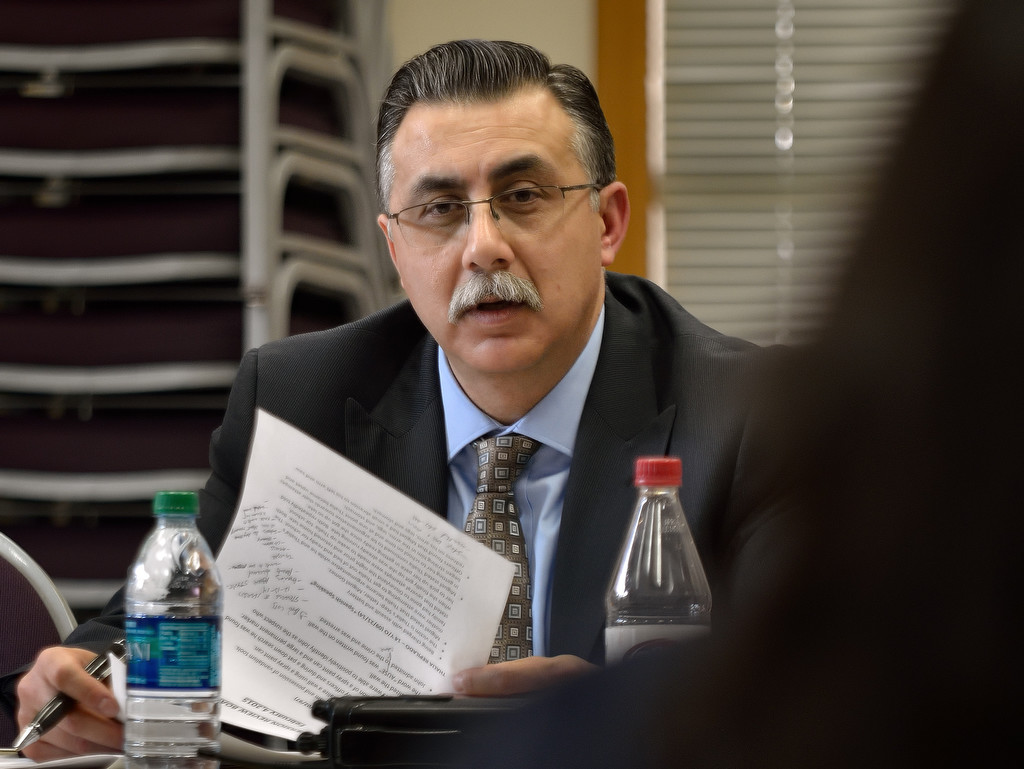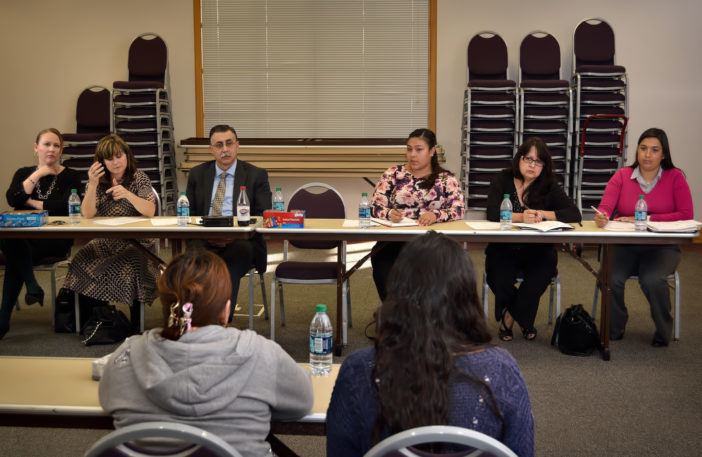The 17-year-old sits straight and speaks quietly.
Within minutes, the eight-person board knows he’s lying.
La Habra police caught the teen tagging, leaving a signature on a block wall that Sgt. Jose Quirarte recognized.
Quirarte has seen that signature on other walls in the city.
The teen says he only left his trademark tag once in La Habra because he was bored.
“I don’t believe you,” Quirarte tells the teen.

Sgt. Jose Quirarte listens to a teen talk about assaulting her step father. Quirarte is a member of the Diversion Review Board, which is tasked with giving teens arrested for non-violent crime a chance to rehabilitate.
Although obviously nervous, his hands in his lap, the teen sticks to his story.
His father, a former gang member, and step-mother also are there.
The teen’s father tells the panel he’s struggling to keep his son in school and sees him flirting with the gang lifestyle.
“I try the best that I can but I can’t watch him all the time,” the father tells the board.
The Diversion Review Board is there to help.
The 17-year-old is one of dozens to participate in the La Habra Police Department’s diversion program, which offers youth counseling and community service as options to the criminal justice system.
“We want to give these teens a second chance,” Quirarte said. “Our goal is that they don’t become repeat offenders.”
Years ago, the department had a similar program for teens caught breaking the law, but it involved simple punishment for the crime.
“We’d have people come wash cars for a Saturday or something like that, but it doesn’t get to the real problem,” Quirarte said.
Youth Services Officer Nancy Garcia started work to develop the diversion program in 2011 and take a comprehensive look at how the PD could redirect troubled teens to a more positive path.
The team started taking on cases in 2014.
The Diversion Review Board meets monthly and considers cases from teens arrested for a variety of non-violent crimes such as vandalism, assault or drug charges.
Whether it works, Garcia said, is up to the offender.
“The program is entirely voluntary,” Garcia said. “If students don’t finish, don’t have a good attitude or don’t participate, they’ll get dismissed and their case will continue in court.
“Part of this program is admitting they did something wrong and they’re trying to make it right.”
The immediate upside: Teens avoid navigating the criminal justice system and possible fines or jail time.

LHPD Youth Services Officer Nancy Garcia explains how the community service and counseling sessions will work for a teen brought to the Diversion Review Board.
In the long-term, Quirarte said officers hope the teens improves their lives.
“If we can avoid sending them through the court system and address any underlying issues they may have so that it doesn’t become a bigger issue, that is why we do it,” Quirarte said.
In many cases, troubles at home or school prompt students to act out, which is why the counseling piece of the diversion program is crucial.
La Habra police partner with the Gary Center, the La Habra Family Resource Center and the La Habra Community Center to map out a comprehensive action plan for each student.
Garcia said teens that come before the board at first can be resistant, but with the help of counselors, students often break down and are open to receiving help.
“Once we get to the root of the problem, that tough exterior is completely gone and they become kids again,” she said.
On a recent Wednesday, the board hands down its ruling to the 17-year-old tagger. He is required to do 80 hours of community service, 20 hours of individual counseling and 12 family counseling sessions.
The teen’s parents also are assigned to parenting classes.
As the family gets up to leave the room, the teen’s father turns to the board: “Can I continue parenting classes even after this is over?”
“Yes,” the board members tell him.
“That is really cool,” he says.
It’s the first step in what board members hope will be a positive outcome.
 Behind the Badge
Behind the Badge



